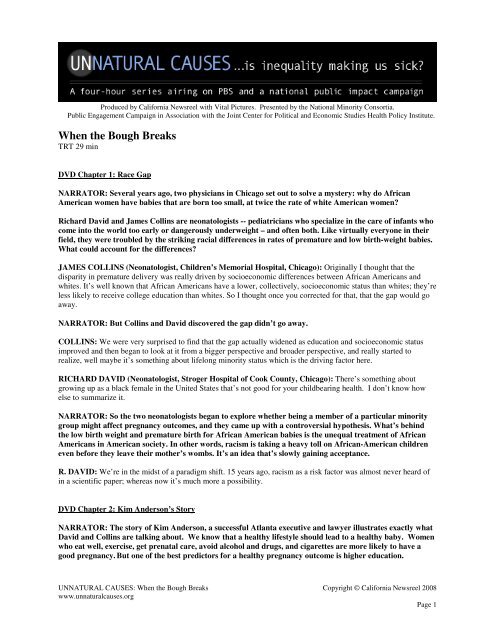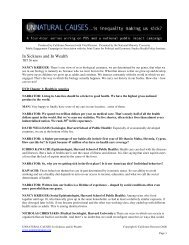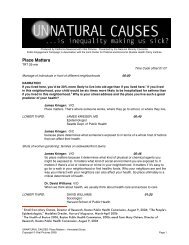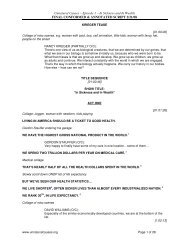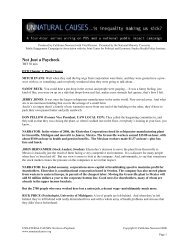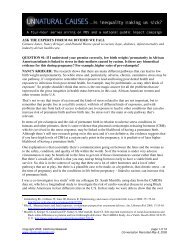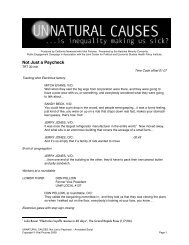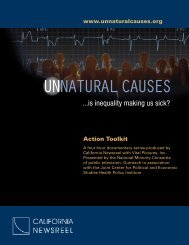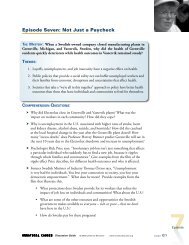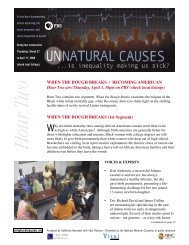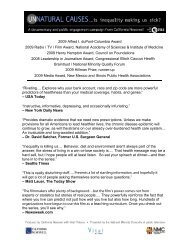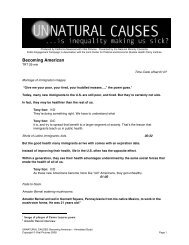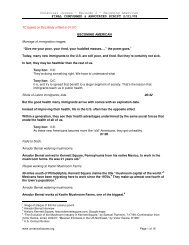When the Bough Breaks - Transcript (pdf) - Unnatural Causes
When the Bough Breaks - Transcript (pdf) - Unnatural Causes
When the Bough Breaks - Transcript (pdf) - Unnatural Causes
- No tags were found...
Create successful ePaper yourself
Turn your PDF publications into a flip-book with our unique Google optimized e-Paper software.
Produced by California Newsreel with Vital Pictures. Presented by <strong>the</strong> National Minority Consortia.Public Engagement Campaign in Association with <strong>the</strong> Joint Center for Political and Economic Studies Health Policy Institute.<strong>When</strong> <strong>the</strong> <strong>Bough</strong> <strong>Breaks</strong>TRT 29 minDVD Chapter 1: Race GapNARRATOR: Several years ago, two physicians in Chicago set out to solve a mystery: why do AfricanAmerican women have babies that are born too small, at twice <strong>the</strong> rate of white American women?Richard David and James Collins are neonatologists -- pediatricians who specialize in <strong>the</strong> care of infants whocome into <strong>the</strong> world too early or dangerously underweight – and often both. Like virtually everyone in <strong>the</strong>irfield, <strong>the</strong>y were troubled by <strong>the</strong> striking racial differences in rates of premature and low birth-weight babies.What could account for <strong>the</strong> differences?JAMES COLLINS (Neonatologist, Children’s Memorial Hospital, Chicago): Originally I thought that <strong>the</strong>disparity in premature delivery was really driven by socioeconomic differences between African Americans andwhites. It’s well known that African Americans have a lower, collectively, socioeconomic status than whites; <strong>the</strong>y’reless likely to receive college education than whites. So I thought once you corrected for that, that <strong>the</strong> gap would goaway.NARRATOR: But Collins and David discovered <strong>the</strong> gap didn’t go away.COLLINS: We were very surprised to find that <strong>the</strong> gap actually widened as education and socioeconomic statusimproved and <strong>the</strong>n began to look at it from a bigger perspective and broader perspective, and really started torealize, well maybe it’s something about lifelong minority status which is <strong>the</strong> driving factor here.RICHARD DAVID (Neonatologist, Stroger Hospital of Cook County, Chicago): There’s something aboutgrowing up as a black female in <strong>the</strong> United States that’s not good for your childbearing health. I don’t know howelse to summarize it.NARRATOR: So <strong>the</strong> two neonatologists began to explore whe<strong>the</strong>r being a member of a particular minoritygroup might affect pregnancy outcomes, and <strong>the</strong>y came up with a controversial hypo<strong>the</strong>sis. What’s behind<strong>the</strong> low birth weight and premature birth for African American babies is <strong>the</strong> unequal treatment of AfricanAmericans in American society. In o<strong>the</strong>r words, racism is taking a heavy toll on African-American childreneven before <strong>the</strong>y leave <strong>the</strong>ir mo<strong>the</strong>r’s wombs. It’s an idea that’s slowly gaining acceptance.R. DAVID: We’re in <strong>the</strong> midst of a paradigm shift. 15 years ago, racism as a risk factor was almost never heard ofin a scientific paper; whereas now it’s much more a possibility.DVD Chapter 2: Kim Anderson’s StoryNARRATOR: The story of Kim Anderson, a successful Atlanta executive and lawyer illustrates exactly whatDavid and Collins are talking about. We know that a healthy lifestyle should lead to a healthy baby. Womenwho eat well, exercise, get prenatal care, avoid alcohol and drugs, and cigarettes are more likely to have agood pregnancy. But one of <strong>the</strong> best predictors for a healthy pregnancy outcome is higher education.UNNATURAL CAUSES: <strong>When</strong> <strong>the</strong> <strong>Bough</strong> <strong>Breaks</strong> Copyright © California Newsreel 2008www.unnaturalcauses.orgPage 1
KIM ANDERSON: This is a picture of me, May 1984, when I graduated from Columbia Law School. Peoplewould think I’m living <strong>the</strong> American Dream: a lawyer with two cars, two and a half kids, <strong>the</strong> dog, <strong>the</strong> porch, a goodhusband, great family. I’ve always been lucky to have good health. Always ate well. Exercised. Never smoked.NARRATOR: So when we look at Kim Anderson – a well-paid lawyer in good health -- we would expect hernewborn to be a healthy, full-term baby. It didn’t turn out that way. Back in 1990 when she was pregnantwith her first child, Kim went into labor two and a half months early.KIM ANDERSON: I just wanted to know at least that if she was born alive, that at least we had a fighting chance. Iheard her cry, I said, “Thank, God.” But she was so small. I mean you could like, hold her in <strong>the</strong> palm of your hand.NARRATOR: Kim’s baby, Danielle, weighed only two pounds thirteen ounces when she was born. She joined<strong>the</strong> ranks of almost 300,000 low birth-weight infants born in <strong>the</strong> U.S. that year, about 1 out of every 14babies, all of <strong>the</strong>m at a high risk of dying before <strong>the</strong>ir first birthday.KIM ANDERSON: I remember getting home and being in <strong>the</strong> bathroom, just, I fell apart. You know, ‘cause it’slike I didn’t get to take my baby home, you know. I remember just sort of falling apart.NARRATOR: Preterm and low birth weight are <strong>the</strong> leading reasons that <strong>the</strong> US claims <strong>the</strong> dubiousdistinction of having one of <strong>the</strong> worst infant survival rates in <strong>the</strong> industrialized world. We fall behind dozensof countries. Babies born in Slovenia, Cyprus, Malta and Croatia stand a better chance of living to <strong>the</strong> age ofone than a baby born here.R. DAVID: It is kind of like <strong>the</strong> canary in <strong>the</strong> mine; it’s <strong>the</strong> most sensitive of our health outcome indicators perpopulation.NARRATOR: And infant mortality is not just a problem for African Americans.R. DAVID: White Americans, if <strong>the</strong>y were a separate country, would still rank 23 rd in <strong>the</strong> world. So outcomes arevery bad.NARRATOR: As a country we pay an enormous price for our high rate of premature and low birth weightbabies. Pre term birth is <strong>the</strong> second leading cause of death for infants. If <strong>the</strong>y’re lucky enough to survive,many face a lifetime of learning and medical problems. Studies show that prematurity increases <strong>the</strong> risk forhypertension, diabetes and coronary artery disease. And <strong>the</strong> high cost of <strong>the</strong>ir medical care begins <strong>the</strong>moment <strong>the</strong>y’re born. One month’s stay in a neonatal intensive care unit averages $68,000 dollars.COLLINS: Neonatology is a lot of things. Inexpensive is not one of <strong>the</strong>m. And we spend a disproportionately highamount of our income as a society taking care of infants, a lot of whose problems probably could have beenprevented if <strong>the</strong>y had stayed in <strong>the</strong> womb until term.NURSE: Her current weight today, mom, is 2 pounds, 6.3 ounces.MOM WITH PREMIE: Ok.NURSE: Ok? So she’s gaining, she gained 15 grams from yesterday.MOM WITH PREMIE: This is my first child, so I was like just amazed, y‘know, and I was, I was a little shocked.I have never seen a child this small before - never. It just took me away, but you see how she is now – she’s 2pounds. So, miracles do happen. Everyday.UNNATURAL CAUSES: <strong>When</strong> <strong>the</strong> <strong>Bough</strong> <strong>Breaks</strong> Copyright © California Newsreel 2008www.unnaturalcauses.orgPage 2
DVD Chapter 3: SES, Genes, & HealthNARRATOR: In <strong>the</strong> terminology of social scientists, Kim Anderson’s family enjoys high socioeconomicstatus, which increases <strong>the</strong> odds for overall good health.DAVID WILLIAMS (Sociologist, Harvard School of Public Health): Persons who are higher in socioeconomicstatus, persons who have more income or more education or better jobs or more wealth, live longer, and have fewerhealth problems than those who are lower in socioeconomic status.CAMARA PHYLLIS JONES (Medical Epidemiologist, Centers for Disease Control and Prevention):Education, for example, predicts infant mortality for both black women and white women. And <strong>the</strong> more educatedyou are, <strong>the</strong> less likely you are to have a low birth-weight baby, a preterm baby, or an infant death.NARRATOR: Women who are poorest and least educated are those whose babies are at greatest risk in anyracial group. But <strong>the</strong> babies of African American mo<strong>the</strong>rs with higher education are still at greater risk thanwe’d expect. Infant mortality among white American women with a college degree or higher is about 4 deathsper thousand births.But among African American women with <strong>the</strong> same level of education, infant mortality is about 10 perthousand births – almost three times higher. In fact, African American mo<strong>the</strong>rs with a college degree haveworse birth outcomes than white mo<strong>the</strong>rs without a high school education.MICHAEL LU (Obstetrician, David Geffen School of Medicine, UCLA): Think about this. We’re talking aboutAfrican-American doctors, lawyers, and business executives. And <strong>the</strong>y still have a higher infant mortality rate thannon-Hispanic white women who never went to high school in <strong>the</strong> first place.KIM ANDERSON: As a mo<strong>the</strong>r you’re thinking: I did all <strong>the</strong> right things. They told me to take vitamins; I tookvitamins. They told me to walk. They told me to eat vegetables. They told me not to drink. I didn’t do all that, andwhy is my kid sitting here with <strong>the</strong>se needles and, you know, so you feel real helpless. You really feel helpless.NARRATOR: So Doctors Collins and David asked <strong>the</strong>mselves if <strong>the</strong> answer could possibly be genetic – it’swell known that prematurity can run in families. Is <strong>the</strong>re something in <strong>the</strong> DNA of African American womenthat tends toward premature births regardless of education, prenatal care, or lifestyle? To answer <strong>the</strong>question, <strong>the</strong>y created a study based on a simple assumption:R. DAVID: If <strong>the</strong>re was such a thing as a “prematurity” gene, and it came from Africa, <strong>the</strong>n Africans should havemore of it.NARRATOR: They compared newborns among three groups: African American women, Africanimmigrants to <strong>the</strong> U.S., and U.S.-born white women.R. DAVID: It turns out that <strong>the</strong> Africans and <strong>the</strong> whites were about <strong>the</strong> same. The African Americans, on <strong>the</strong> o<strong>the</strong>rhand, had babies that weighed almost eight or nine ounces less than <strong>the</strong> o<strong>the</strong>r two groups.NARRATOR: In o<strong>the</strong>r words, African immigrants to <strong>the</strong> U.S. and white women born in <strong>the</strong> U.S. had similarpregnancy outcomes. So if <strong>the</strong>re is any genetic pre-disposition for low birth weight babies, it’s doubtful that itfalls along what we call racial lines. It turns out that when African women immigrate to <strong>the</strong> US, it takes onlyone generation before <strong>the</strong>ir daughters are at risk of having premature babies at a significantly higher rateand with poorer birth outcomes.R. DAVID: Has her heart rate been in that range? Over 180?NURSE: No actually, it’s been about 160.UNNATURAL CAUSES: <strong>When</strong> <strong>the</strong> <strong>Bough</strong> <strong>Breaks</strong> Copyright © California Newsreel 2008www.unnaturalcauses.orgPage 3
COLLINS: So within one generation, women of African descent are doing poorly. This to us really suggests thatsomething is driving this that’s related to <strong>the</strong> social milieu that African American women live in throughout <strong>the</strong>irentire life.DVD Chapter 4: Civil Rights GainsNARRATOR: The news was once more hopeful. During <strong>the</strong> 1960s and 70s, with <strong>the</strong> civil rights and antipovertymovements, <strong>the</strong> health of African Americans compared to whites improved overall. Governmentinitiatives not only integrated hospitals, but also opened up education opportunities and better jobs andhousing. The health of African-Americans began to catch up with that of whites. And infant mortality ratesin <strong>the</strong> African American community declined.CAMARA JONES: During my lifetime <strong>the</strong> gap has closed a bit, and I think it’s as a result of social policies. After<strong>the</strong> War on Poverty and <strong>the</strong> civil rights movement, we had social policies that were allowing people moreopportunity.NARRATOR: But in <strong>the</strong> 1980s, economic growth stagnated, and government began cutting back socialprograms. The impact on infant deaths was dramatic. The ratio of infant mortality among AfricanAmericans compared to whites began to climb. And continues to climb today.But that doesn’t explain <strong>the</strong> case of middle-class African American women like Kim Anderson. Why shouldhighly educated women with good incomes still have high rates of premature and low birth weight babies?Once again a study by Collins and David points to racism as a key factor.R. DAVID: Women who perceived that <strong>the</strong>y had been treated unfairly on <strong>the</strong> basis of <strong>the</strong>ir race, whe<strong>the</strong>r it waslooking for work, in an educational setting, or a variety of o<strong>the</strong>r settings, had more than two-fold increased risk ofvery low birth weight infant.DVD Chapter 5: Chronic StressNARRATOR: So if racism is contributing to premature births among African American women – how doesit work? How might racism take a physical toll on <strong>the</strong> human body over a lifetime? Increasingly researchersare looking at chronic stress – <strong>the</strong> stress caused by living day in and day out with discrimination.COLLINS: Recent data suggests that chronic stress associated with being a minority, particularly being AfricanAmerican, for some biological reason, increases <strong>the</strong> risk of delivering a premature, low birth weight infant.TYAN PARKER DOMINGUEZ (Assistant Professor, USC School of Social Work): <strong>When</strong> you have a reactionto a situation in your life that makes you anxious or gets you stressed out, you not only have a psychological oremotional reaction to that; you also have a body reaction.MICHAEL LU: And if that stress is chronic, constant, and you just can’t escape it, over time that chronic stress, <strong>the</strong>chronic activation of that response, creates wear and tear on your body’s organs and systems so that you create thisoverload on <strong>the</strong>se systems so that <strong>the</strong>y don’t work very well.NARRATOR: Researchers believe stress can affect pregnancy outcomes in several different ways. Stresshormones are part of <strong>the</strong> intricate chemistry of pregnancy under normal conditions. <strong>When</strong> those hormonesreach a certain level <strong>the</strong>y may help trigger labor. But what might happen if you went into pregnancy alreadyoverloaded with stress hormones?DOMINGUEZ: Think about a woman who is pregnant who is under a great deal of stress. Her body is going tostart pumping out extra stress hormones. And so she may reach that tipping point for labor to begin sooner.UNNATURAL CAUSES: <strong>When</strong> <strong>the</strong> <strong>Bough</strong> <strong>Breaks</strong> Copyright © California Newsreel 2008www.unnaturalcauses.orgPage 4
NARRATOR: Stress can also constrict blood flow to <strong>the</strong> placenta, which could limit fetal growth and maylead to premature delivery. Chronic stress may also contribute to serious inflammation inside <strong>the</strong> uterus,which can trigger premature labor. Research suggests it’s not so much stress during pregnancy that maydetermine <strong>the</strong> health of a mo<strong>the</strong>r’s baby, but <strong>the</strong> cumulative experiences of <strong>the</strong> mo<strong>the</strong>r over <strong>the</strong> course of herentire life, regardless of race. Dr. Lu calls this hypo<strong>the</strong>sis <strong>the</strong> “life-course perspective.”LU: The life-course perspective posits that birth outcomes are <strong>the</strong> product of not simply <strong>the</strong> nine months ofpregnancy, but really <strong>the</strong> entire life course of a woman. And <strong>the</strong> corollary for that is, disparity in birth outcomes isreally <strong>the</strong> consequences not only of differential exposures during pregnancy, but really <strong>the</strong> differential experiencesacross <strong>the</strong> life-course of women of color.NARRATOR: But is racism so dominant throughout <strong>the</strong> lives of African American women, that it can affect<strong>the</strong> birth outcomes of <strong>the</strong>ir children? One recent study reports that <strong>the</strong> majority of white Americans believeracial discrimination is a problem of <strong>the</strong> past. The evidence indicates o<strong>the</strong>rwise. For example, AfricanAmericans at all income levels are more likely to be denied mortgages, pay more for automobiles, and receivefewer job interviews.DAVID WILLIAMS: It was a fairly dramatic study done in Milwaukee, Wisconsin where <strong>the</strong>y sent black andwhite men, all with identical resumes to apply for 350 entry-level jobs. What this study found was that a black malewith a clean record, no criminal record, was less likely to be offered a job than a white male with a felonyconviction. So it was a dramatic example of – in <strong>the</strong> year 2004 – of <strong>the</strong> persistence of discrimination in Americansociety.NARRATOR: This racial stress can have a life-long impact on African American families and <strong>the</strong>ir health.DVD Chapter 6: Institutional RacismRICHARD DAVID: Racism is a societal level problem. It’s institutionalized; it’s part of our educational system;it’s part of our media; it’s part of our culture. It’s one of <strong>the</strong> struts that reinforces inequality in <strong>the</strong> society we live in.KIM ANDERSON: So nobody, when I walk in a store, nobody says, “Oh, that’s Kim Anderson, African-American, female lawyer, went to Columbia,” <strong>the</strong>y just see a black woman. I was in a store once, just walkingaround, thinking I was going to buy a pair of jeans. This clerk’s following me around. So I said, “Why are youfollowing me around? I’m not going to steal anything. Leave me alone. I’m not going to take something.” <strong>When</strong>you’re confronted with racism, that covert racism, your stomach just gets like so tight. You can feel it almostmoving through your body; almost you can feel it going into your bloodstream.NANCY KRIEGER (Social Epidemiologist, Harvard School of Public Health): There are very different kinds ofquote, unquote stressors in <strong>the</strong> world. You can have a bad day and somebody else can have a bad day. They can cutyou out of a parking space. It’s an occasion, but it’s not premised on <strong>the</strong> idea of second-class citizenship. It’s notsomething that is a repeated and reactivated insult that occurs.LU: So if we’re serious about improving birth outcomes and reducing disparities, we’ve got to start taking care ofwoman before pregnancy and not just talking about that one visit three months pre-conceptionally; I’m talking aboutwhen she’s a baby inside her mo<strong>the</strong>r’s womb, an infant, and <strong>the</strong>n a child, an adolescent and really taking care ofwomen and families across <strong>the</strong>ir life course.NARRATOR: So how do we actually identify and measure <strong>the</strong> kind of subtle, everyday racism that followsblack women throughout <strong>the</strong>ir lives?Camara Phyllis Jones is a family physician and epidemiologist at <strong>the</strong> Centers for Disease Control. She wasone among of <strong>the</strong> first to investigate <strong>the</strong> connection between racism and health. One study looking at chronicdiseases in over 100,000 women, posed a critical question to get a better understanding of how womeninternalize <strong>the</strong>ir racial experience.UNNATURAL CAUSES: <strong>When</strong> <strong>the</strong> <strong>Bough</strong> <strong>Breaks</strong> Copyright © California Newsreel 2008www.unnaturalcauses.orgPage 5
JONES: How often do you think about your race? For white women, fifty percent saying that <strong>the</strong>y never thinkabout <strong>the</strong>ir race. For black women, almost fifty percent think about <strong>the</strong>ir race once a day or more frequently, withtwenty-one percent thinking about <strong>the</strong>ir race constantly. That’s an eternity of experience apart.DVD Chapter 7: Everyday RacismCAROL HOGUE (Epidemiologist, Emory University): Recently <strong>the</strong>re has been a coming toge<strong>the</strong>r around <strong>the</strong>hypo<strong>the</strong>sis that stress really does make a difference. And that racism is a particular kind of stressor. It’s like an addonto <strong>the</strong> o<strong>the</strong>r stressors of one’s life: losing a job, losing a spouse, etc. The question is, “how do you address this?”You have to measure it.FOCUS GROUP WOMAN #1: You know, <strong>the</strong>re have been times where I’ve called on <strong>the</strong> phone and been like – Ican’t do this today y’all. Somebody, you know, come help, come…NARRATOR: Finding ways to identify and measure racism is a challenging task. Psychologist Fleda Jackson,sociologist Mona Phillips and epidemiologist Carol Hogue have attempted to measure <strong>the</strong> impact of racism onmiddle-class African American women. It’s a first step in understanding how ordinary, daily encounters withracism can affect women throughout <strong>the</strong>ir life course.FLEDA JACKSON (Psychologist, Emory University): To collect <strong>the</strong> data we decided we first needed to hearfrom African-American women about what were <strong>the</strong> stressors in <strong>the</strong>ir lives. And so we started with focus groups.HOGUE: And over a period of about 15 years, we evolved this measure, which is gendered. It’s only just forAfrican-American women.FOCUS GROUP WOMAN #1: I think constantly having to internalize <strong>the</strong> racism that we experience every day.It’s like, to me, where do you escape to? My daughter she’s real open and friendly, and so, you know, she’ll run upto <strong>the</strong> white children and say, “Can I play with you?” And <strong>the</strong>n <strong>the</strong>y don’t even answer; <strong>the</strong>y just look at her and runaway. It’s heartbreaking for me to see that.JACKSON: If you have to take children outside of your neighborhood for <strong>the</strong> best educational opportunities; if youhave concerns that <strong>the</strong>y will be racially profiled; if <strong>the</strong>re are concerns about <strong>the</strong> opportunities that <strong>the</strong>y will have, allof that represents serious kinds of stresses that are experienced by African-American women on a constant basis.JONES: It’s like gunning <strong>the</strong> engine of a car, without ever letting up. Just wearing it out, wearing it out without rest.And I think that <strong>the</strong> stresses of everyday racism are doing that.FOCUS GROUP WOMAN #2: You have a doctor that comes in that doesn’t really pay attention to what it isyou’re saying, that invalidates what it is you’re saying.FOCUS GROUP WOMAN #3: No matter how many times I made it to <strong>the</strong> final interview, or how many programscome out of my research, it’s just not enough. And I think it’s unfortunate, but it does something to me internally.I’ve taken jobs, I mean, getting paid way less than <strong>the</strong> people that I know don’t have as much education. I don’tknow what kind of resume to write at this point. So, you know, I’m scared to give people a resume.NARRATOR: Can we protect African American women’s bodies from <strong>the</strong> wear and tear of racism? Oneprogram, The Family Health and Birth Center in Washington, DC provides family support, employment andfinancial counseling-- and prenatal care. The result: preterm births were reduced by a third and low birthweight deliveries cut in half.UNNATURAL CAUSES: <strong>When</strong> <strong>the</strong> <strong>Bough</strong> <strong>Breaks</strong> Copyright © California Newsreel 2008www.unnaturalcauses.orgPage 6
DVD Chapter 8: CodaNARRATOR: In Kim Anderson’s case it’s impossible to pinpoint one cause for Danielle’s premature birth–<strong>the</strong> stress of racism, genetic predisposition, or o<strong>the</strong>r factors. But researchers work with averages, notindividuals. And with thousands of examples – <strong>the</strong> evidence pointing to <strong>the</strong> impact of racism and stress onpregnancy outcomes is becoming hard to ignore.KIM ANDERSON: Danielle was discharged, even though she was so small, you know four pounds, but she justpulled through. She could have had sight problems; she could have had learning disabilities. She’s a great student.She doesn’t have problems with health. It could have been so different. It could have been so different.MICHAEL LU: What kind of nation do we want? I have two daughters, and <strong>the</strong> question is: What kind of nationdo we want <strong>the</strong>m to-to grow up in? This nation was founded on <strong>the</strong> self-evident truth that all men and women arecreated equal, and yet 230 years later, that truth still not quite so self-evident. Right – you ain’t created equal if youcan’t get a equal start.KIM ANDERSON: Sometimes I do worry what would happen if my daughter delivered a preemie. I’m looking at asecond-generation preemie who says she wants to be a cardiologist and neonatologist, which to me is stress on topof stress, and as a African American woman, (laugh) who now wears dreads. So, so all those things that are going tobe on her heart, on her mind, in her life. You don’t want her have to worry about what to do with a preemie. Justdon’t want her to have to go through that and experience that, and wonder what <strong>the</strong> outcome would be. And I hope, Ipray, that if it happens, her outcome will be as blessed and successful as ours has been with her.ENDUNNATURAL CAUSES: <strong>When</strong> <strong>the</strong> <strong>Bough</strong> <strong>Breaks</strong> Copyright © California Newsreel 2008www.unnaturalcauses.orgPage 7


